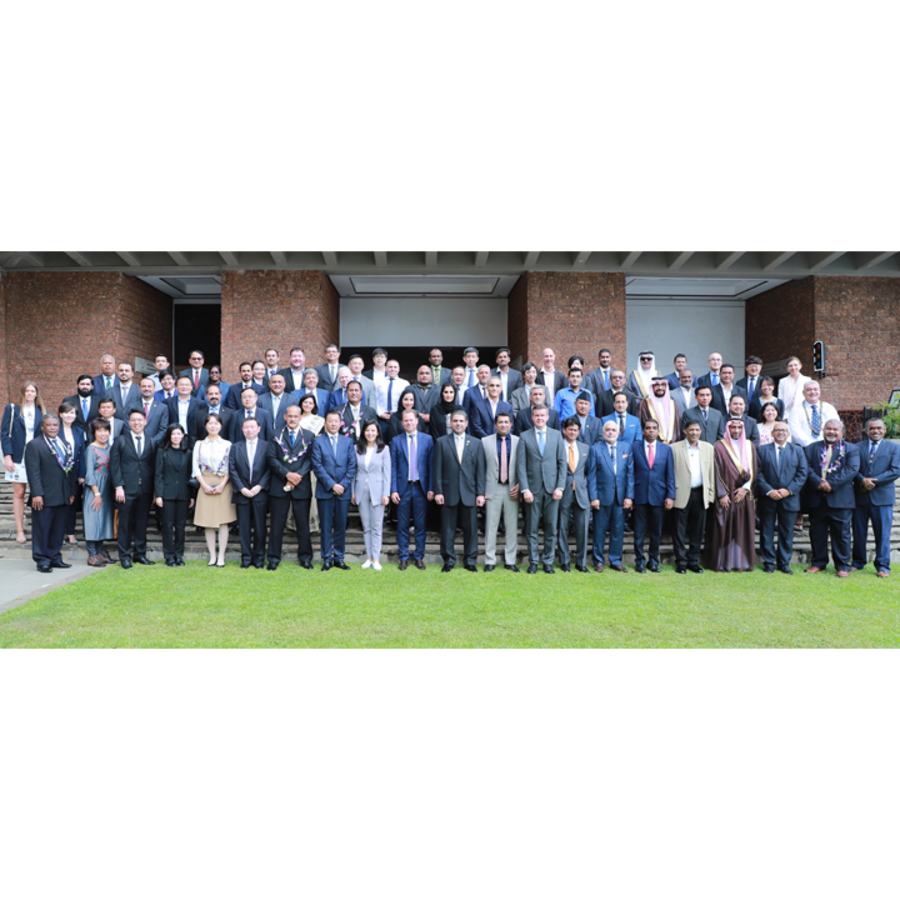Releases
WADA leadership plays key role at the 18th Asia/Oceania Region Intergovernmental Ministerial Meeting on Anti-Doping in Sport in Sri Lanka

At this week’s 18th Asia/Oceania Region Intergovernmental Ministerial Meeting on Anti-Doping in Sport, the President, Vice-President and Director General of the World Anti-Doping Agency (WADA) reflected on the prominent place the region holds in world sport, and they encouraged the 35 countries represented to continue collaborating to strengthen the anti-doping system for athletes throughout the two continents.
During the two-day meeting, which took place on 12-13 June in Colombo, Sri Lanka, representatives of the Governments of the Asia/Oceania region adopted a resolution committing their support for the continued and sustained development of anti-doping programs across the region. They also discussed the possible UNESCO Conference of Parties (CoP) to the International Convention against Doping in Sport resolution to review the regional split formula currently in force to fund WADA. The resolution is slated to be submitted to the next CoP meeting in October 2023.
In his opening address, WADA President Witold Bańka thanked the Government of Sri Lanka for co-hosting the meeting with the Sri Lanka National Anti-Doping Agency (SLADA) and commended WADA’s partners in the Asia and Oceania region for their efforts in protecting clean sport. He also provided important updates regarding the upcoming World Anti-Doping Program review that was endorsed by WADA’s Executive Committee (ExCo) in May 2023.
Mr. Bańka said: “Asia and Oceania are at the forefront of world sport. This region has played host to some of the biggest sporting events of the past decade, including three Olympic and Paralympic Games. It is also scheduled to host many more in the years to come, including WADA’s 6th World Conference on Doping in Sport, which will be held in the city of Busan, South Korea, in November 2025.
“I am encouraged by the willingness of established Anti-Doping Organizations in this region to support the Regional Anti-Doping Organizations with implementation and development of their anti-doping programs. It is only by working in unison that we will be able to successfully level the playing field for athletes around the world.”
The WADA President also shared with the representatives in attendance WADA’s position that discussions regarding the regional split formula to fund the Agency should take place among the Governments of the world in the proper forum, with adequate information being made available, and that this should ultimately lead to a decision based on a full consensus of the Governments. These are conditions that are not met via the current UNESCO process, which has not included an appropriate level of consultation with Governments.
The meeting, which included the presence of nine high-ranking ministers from around the region, opened with participants being welcomed by the Honorable Roshan Ranasinghe, Minister of Sports and Youth Affairs for the Democratic Socialist Republic of Sri Lanka; Dr. Sultan Ya’rub Qahtan Al Busaidi, Chairman of the Olympic Council of Asia Medical Committee; and by the WADA President.
Following an introduction of the forum participants by SLADA Chairman, Professor Arjuna De Silva, WADA Director General Olivier Niggli took the floor to present WADA’s priorities for 2023-2024 and beyond. Along with updates on WADA’s governance reforms and the Agency’s 2020-2024 Strategic Plan, Mr. Niggli provided an overview on the Asia/Oceania region’s anti-doping resources. He also highlighted the addition of regional representatives to various WADA committees, including:
- The appointment of Venetia Bennett, a barrister from Australia, to WADA’s ExCo as the fifth independent member;
- The appointment of Dr. Koji Murofushi, Commissioner of the Japan Sports Agency, to WADA’s ExCo as the representative of the Public Authorities in Asia;
- The election of Ryan Pini, a four-time Olympic swimmer from Papua New Guinea as the inaugural Athlete Council Chair and ExCo Member; and
- The approval of Ana Tuiketei (Fiji) as an independent member on WADA’s Independent Ethics Board.
Mr. Niggli said: “WADA recognizes the importance of Asia and Oceania to the world of sport. We are pleased by the region’s growing presence within WADA’s governance structure, and hope that will continue in the years to come. However, while countries in this region are investing more in anti-doping, there needs to be a more concerted effort by some of the National Anti-Doping Organizations in the region and adequate support from the Governments to increase testing. Authorities must ensure that the money invested is used to implement effective anti-doping programs, and testing is a key element of that.”
Later during the first day, WADA Vice-President Yang Yang opened the afternoon session by stressing the importance of education and of holding the athlete entourage accountable.
She said: “Education remains the best long-term solution for protecting the values of clean sport. It is a critical component of the global anti-doping system and a key pillar of WADA’s overall mission. We are seeing the positive results that education delivers in preventing doping and supporting athletes in their efforts to compete clean throughout their careers.
“Education must extend beyond the athlete to ensure that there are no weak links. By ensuring that the entourage understands the importance of clean competition, it filters down to the athlete. We must all make more efforts in this regard and Governments play a big part by ensuring that National Anti-Doping Organizations are properly resourced and by introducing legislation that can hold any bad actors to account.”

